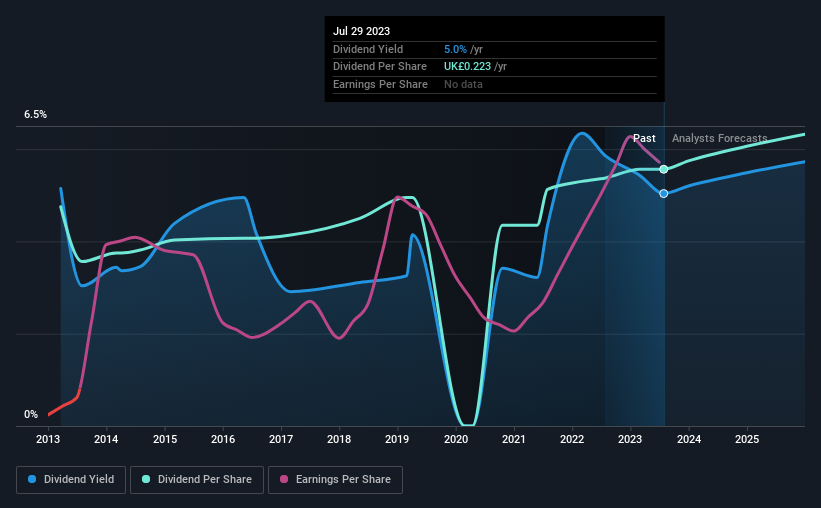Is It Smart To Buy Vesuvius plc (LON:VSVS) Before It Goes Ex-Dividend?
Vesuvius plc (LON:VSVS) stock is about to trade ex-dividend in three days. The ex-dividend date is one business day before the record date, which is the cut-off date for shareholders to be present on the company's books to be eligible for a dividend payment. The ex-dividend date is important as the process of settlement involves two full business days. So if you miss that date, you would not show up on the company's books on the record date. In other words, investors can purchase Vesuvius' shares before the 3rd of August in order to be eligible for the dividend, which will be paid on the 15th of September.
The company's next dividend payment will be UK£0.068 per share, on the back of last year when the company paid a total of UK£0.22 to shareholders. Last year's total dividend payments show that Vesuvius has a trailing yield of 5.0% on the current share price of £4.418. We love seeing companies pay a dividend, but it's also important to be sure that laying the golden eggs isn't going to kill our golden goose! That's why we should always check whether the dividend payments appear sustainable, and if the company is growing.
See our latest analysis for Vesuvius
If a company pays out more in dividends than it earned, then the dividend might become unsustainable - hardly an ideal situation. Fortunately Vesuvius's payout ratio is modest, at just 37% of profit. Yet cash flow is typically more important than profit for assessing dividend sustainability, so we should always check if the company generated enough cash to afford its dividend. Thankfully its dividend payments took up just 38% of the free cash flow it generated, which is a comfortable payout ratio.
It's positive to see that Vesuvius's dividend is covered by both profits and cash flow, since this is generally a sign that the dividend is sustainable, and a lower payout ratio usually suggests a greater margin of safety before the dividend gets cut.
Click here to see the company's payout ratio, plus analyst estimates of its future dividends.
Have Earnings And Dividends Been Growing?
Companies with consistently growing earnings per share generally make the best dividend stocks, as they usually find it easier to grow dividends per share. If business enters a downturn and the dividend is cut, the company could see its value fall precipitously. That's why it's comforting to see Vesuvius's earnings have been skyrocketing, up 35% per annum for the past five years. Vesuvius is paying out less than half its earnings and cash flow, while simultaneously growing earnings per share at a rapid clip. This is a very favourable combination that can often lead to the dividend multiplying over the long term, if earnings grow and the company pays out a higher percentage of its earnings.
Another key way to measure a company's dividend prospects is by measuring its historical rate of dividend growth. In the last 10 years, Vesuvius has lifted its dividend by approximately 1.6% a year on average. Earnings per share have been growing much quicker than dividends, potentially because Vesuvius is keeping back more of its profits to grow the business.
To Sum It Up
Has Vesuvius got what it takes to maintain its dividend payments? Vesuvius has grown its earnings per share while simultaneously reinvesting in the business. Unfortunately it's cut the dividend at least once in the past 10 years, but the conservative payout ratio makes the current dividend look sustainable. There's a lot to like about Vesuvius, and we would prioritise taking a closer look at it.
While it's tempting to invest in Vesuvius for the dividends alone, you should always be mindful of the risks involved. For example, we've found 2 warning signs for Vesuvius (1 is significant!) that deserve your attention before investing in the shares.
A common investing mistake is buying the first interesting stock you see. Here you can find a full list of high-yield dividend stocks.
Have feedback on this article? Concerned about the content? Get in touch with us directly. Alternatively, email editorial-team (at) simplywallst.com.
This article by Simply Wall St is general in nature. We provide commentary based on historical data and analyst forecasts only using an unbiased methodology and our articles are not intended to be financial advice. It does not constitute a recommendation to buy or sell any stock, and does not take account of your objectives, or your financial situation. We aim to bring you long-term focused analysis driven by fundamental data. Note that our analysis may not factor in the latest price-sensitive company announcements or qualitative material. Simply Wall St has no position in any stocks mentioned.
Join A Paid User Research Session
You’ll receive a US$30 Amazon Gift card for 1 hour of your time while helping us build better investing tools for the individual investors like yourself. Sign up here

